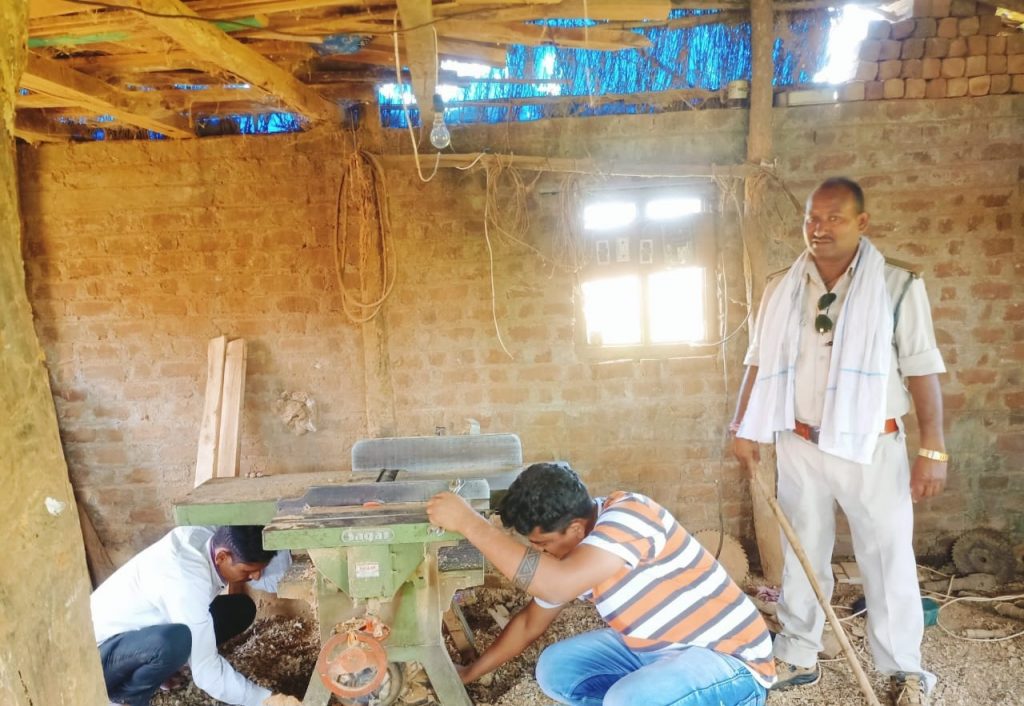Illegal logging is one of the major causes of deforestation and loss of biodiversity. This can lead to uncontrolled emissions at a time when India is trying to reduce the use of fossil fuels and invest in renewables, writes Deepanwita Gita Niyogi
At the 26th United Nations climate summit held in Glasgow last year, Prime Minister Narendra Modi announced his intention to fight climate change by reducing the carbon intensity of the country’s economy by 45 percent by 2030.
India is among the top 10 forest-rich nations of the world. But though forests act as carbon sink and help halt climate change, deforestation is occurring in India at an alarming rate due to developmental activities and mining. Illegal logging of timber is also one of the major causes behind forest loss. This does not bode well at a time when the country is trying to reduce the use of fossil fuels and invest in renewable energy for a greener future.
Illegal trade as well as sale of profitable timber is on in many parts of the country through the mafia. Many of these systematic trade networks flourished during the Covid-19 period due to the lack of proper surveillance. But the forest department is waking up to the challenge and cracking down on criminals.
In the past few months starting August last year, the Sendhwa forest division of Madhya Pradesh in central India conducted multiple raids to seize wood cutter machines, teak logs and illegal furniture. Teams led by divisional forest officer Anupam Sharma also apprehended vehicles loaded with timber.
Dumping ground of illegal timber
The Sendhwa region in Barwani district of Madhya Pradesh, which is not densely forested, has turned into a dumping ground of illegally harvested timber smuggled through the national highway connecting the state with Maharashtra. According to forest range officer Hemant Prajapati, who took part in the raids, information about timber smuggling was received through tip-offs. There have been about four raids led by enthusiastic officers in the division. “After receiving information, raids were conducted and materials seized. Most of the illegal furniture was meant for sale in the local market.”
In this inter-state illegal timber trade, many local people of Sendhwa are involved. As teak is a valuable commodity, criminals mostly work at night. Though the forest department tries its best to keep tabs on timber felling, sometimes it lacks adequate staff for thorough patrolling.
As the Sendhwa forest division shares a border with Maharashtra, it is easy to smuggle the wood out. While Maharashtra’s forests have good quality teak most sought after for furniture, Sendhwa is more of the operation point for furniture and machines, as it lacks quality forested areas due to encroachment. Felling does not happen in Sendhwa due to the lack of exploitable trees.
Nabbing timber mafia
Apprehending criminals who work closely with one another within a network is a challenge as they are armed. When bikes carrying illegal timber were spotted by the department officials during a night patrol last year, the smugglers pelted the team with stones. The team had to return for additional backup force. There were about 15 of them in the gang. Though they managed to escape, the raids unearthed a house full of wood cutter machines, logs and furniture.

Sharma said the raids revealed that sawing and furniture manufacturing take place in Sendhwa. But he admitted that nabbing these gangs is challenging as sometimes the jurisdiction of the forest department changes. “Criminals thus take undue advantage of this situation. However, illegal timber trade is not prevalent across Madhya Pradesh. Sendhwa faces a problem, as it shares a long border with Maharashtra,” the officer added.
Wherever there are good quality forests, illegal timber logging is a reality across India. Investigation in such cases is often difficult but the Sendhwa forest division is on a mission mode to conduct more such raids in future.
Jeevan Polaya, a range officer of Sendhwa in-charge of Dhanora range, said dumping picked up in the division in the past two years. “When we carried out joint raids at several places, we found no valid records, thus showing the operation to be illegal. Supply was mostly done through bikes. Criminals avoided main roads and moved through forested areas.”
There are many new officers in the Sendhwa division under Sharma and as such there is enthusiasm in the team. But firearms cannot always be used by the forest staff and at times special permission has to be taken for this. This gives undue advantage to the mafia.
Forest guard Krishnapal Jhala, who has been posted in the Sendhwa forest division for six years, informed that the past few back to back raids had yielded a huge volume of illegal timber never seen before. Apart from illegal furniture, raw logs of wood were also being sold locally.
Prathamesh Hadape, assistant conservator of forests at Yawal division in Maharashtra, across the border, said it cannot be claimed with certainty that illegal timber is being sourced from Yawal only, lying at a distance of 100 km from Sendhwa. “But we are investigating the matter and it needs to be verified. Some parts of Madhya Pradesh also have quality forests.”
Trade in illegal timber is estimated to be at USD 30 to USD 100 billion annually, and results in crime, corruption and loss of revenue for governments.











